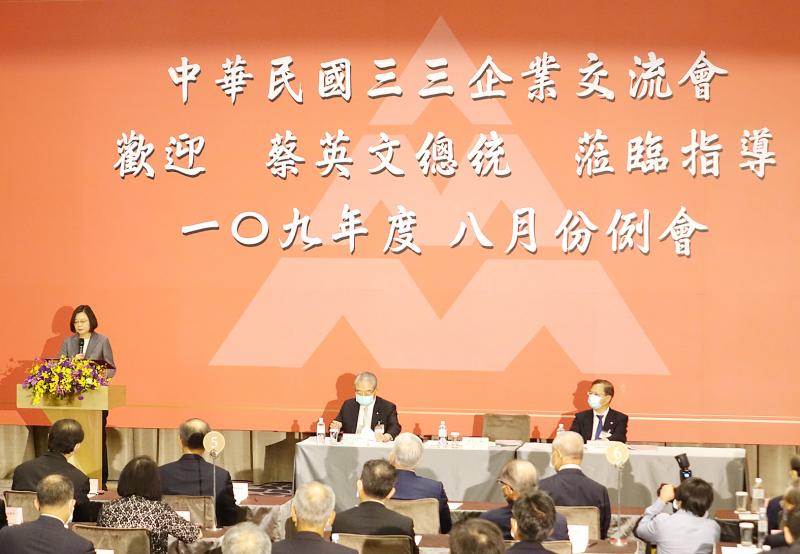Leading industrialists yesterday called on the government to keep relief and stimulus measures alive, saying that tough times lie ahead as local tech firms would be digesting rush orders toward the end of this quarter, because of remote working and telecommuting trends.
Rock Hsu (許勝雄), chairman of the Third Wednesday Club (三三會), whose membership is limited to the top 100 firms in each business sector, spoke to reporters prior to a meeting with President Tsai Ing-wen (蔡英文) in Taipei.
“The government had better prepare an extended version of relief and stimulus measures, as the industry will need it after fulfilling orders” to make chips for electronic parts used in laptops, desktops, TVs and other products, Hsu said.

Photo: Wang Yi-sung, Taipei Times
Local technology firms have benefited from a surge in demand for devices that have enabled companies and schools around the world to operate, despite travel inconveniences and social distancing, said Hsu, who is chairman of contract notebook maker Compal Electronics Inc (仁寶電腦).
Such rush orders would come to an end later this quarter, making the fourth quarter — normally the high sales season — a tough challenge, he said, adding that the global economy is still in a shambles.
Major tech firms have declined to give business guidance beyond the current quarter, citing poor order visibility.
The US’ Apple Inc has said that it would postpone new iPhone releases and China’s Huawei Technologies Co (華為) is reportedly is slowing its deployment of 5G products after a Washington ban has limited it from obtaining foreign-made chips developed or produced using US software or technology.
Manufacturers of mineral, plastic, base metal and other non-tech products would also continue to struggle due to sluggish demand, Hsu said.
Chinese National Association of Industry and Commerce (工商協進會) chairman Lin Por-fong (林伯豐) said that there is still ample room for the government to augment relief and stimulus measures, which currently stand at 6.6 percent of GDP, while packages in other countries account for more than 10 percent of GDP.
The government could do so by lowering the business tax or sparing companies the levy on retained earnings, at least temporarily, Lin said.
Far Eastern Group (遠東集團) chairman Douglas Hsu (徐旭東) said that the government could consider issuing a second batch of Triple Stimulus Vouchers to shore up domestic demand if its budget allows.
Most business tycoons painted the plans by the Ministry of Labor to raise monthly basic wages by NT$200 to NT$24,000 as unfavorable, but bearable.
The wage adjustments must still be approved by the Cabinet.

Taiwan will prioritize the development of silicon photonics by taking advantage of its strength in the semiconductor industry to build another shield to protect the local economy, National Development Council (NDC) Minister Paul Liu (劉鏡清) said yesterday. Speaking at a meeting of the legislature’s Economics Committee, Liu said Taiwan already has the artificial intelligence (AI) industry as a shield, after the semiconductor industry, to safeguard the country, and is looking at new unique fields to build more economic shields. While Taiwan will further strengthen its existing shields, over the longer term, the country is determined to focus on such potential segments as

UNCERTAINTY: Innolux activated a stringent supply chain management mechanism, as it did during the COVID-19 pandemic, to ensure optimal inventory levels for customers Flat-panel display makers AUO Corp (友達) and Innolux Corp (群創) yesterday said that about 12 to 20 percent of their display business is at risk of potential US tariffs and that they would relocate production or shipment destinations to mitigate the levies’ effects. US tariffs would have a direct impact of US$200 million on AUO’s revenue, company chairman Paul Peng (彭雙浪) told reporters on the sidelines of the Touch Taiwan trade show in Taipei yesterday. That would make up about 12 percent of the company’s overall revenue. To cope with the tariff uncertainty, AUO plans to allocate its production to manufacturing facilities in

COLLABORATION: Given Taiwan’s key position in global supply chains, the US firm is discussing strategies with local partners and clients to deal with global uncertainties Advanced Micro Devices Inc (AMD) yesterday said it is meeting with local ecosystem partners, including Taiwan Semiconductor Manufacturing Co (TSMC, 台積電), to discuss strategies, including long-term manufacturing, to navigate uncertainties such as US tariffs, as Taiwan occupies an important position in global supply chains. AMD chief executive officer Lisa Su (蘇姿丰) told reporters that Taiwan is an important part of the chip designer’s ecosystem and she is discussing with partners and customers in Taiwan to forge strong collaborations on different areas during this critical period. AMD has just become the first artificial-intelligence (AI) server chip customer of TSMC to utilize its advanced

Chizuko Kimura has become the first female sushi chef in the world to win a Michelin star, fulfilling a promise she made to her dying husband to continue his legacy. The 54-year-old Japanese chef regained the Michelin star her late husband, Shunei Kimura, won three years ago for their Sushi Shunei restaurant in Paris. For Shunei Kimura, the star was a dream come true. However, the joy was short-lived. He died from cancer just three months later in June 2022. He was 65. The following year, the restaurant in the heart of Montmartre lost its star rating. Chizuko Kimura insisted that the new star is still down